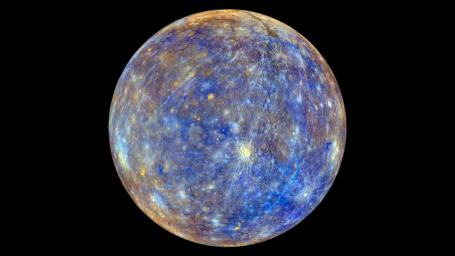
|
Colors of the Innermost Planet: View 2
- Click the image above for a larger view
- Full-Res JPEG (1920 x 1080) (235.6 kB)
- Full-Res TIFF (1920 x 1080) (6.2 MB)
Caption:
This colorful view of Mercury was produced by using images from the color base map imaging campaign during MESSENGER's primary mission. These colors are not what Mercury would look like to the human eye , but rather the colors enhance the chemical, mineralogical, and physical differences between the rocks that make up Mercury's surface.
Young crater rays , extending radially from fresh impact craters, appear light blue or white. Medium- and dark-blue areas are a geologic unit of Mercury's crust known as the "low-reflectance material" , thought to be rich in a dark, opaque mineral. Tan areas are plains formed by eruption of highly fluid lavas . The crater in the upper right whose rays stretch across the planet is Hokusai .
To see the other side of the planet view this image .
To watch a movie of this colorful view of Mercury as a spinning globe
click here
or visit the mission's
Movie Page
.
Instrument:
Wide Angle Camera (WAC) of the Mercury Dual Imaging System (MDIS)
Center Latitude:
0°
Center Longitude:
320° E
Scale:
Mercury's diameter is 4880 kilometers (3030 miles)
Map Projection:
orthographic
Background Info:
The MESSENGER spacecraft is the first ever to orbit the planet Mercury, and the spacecraft's seven scientific instruments and radio science investigation are unraveling the history and evolution of the Solar System's innermost planet. Visit the Why Mercury? section of this website to learn more about the key science questions that the MESSENGER mission is addressing. During the one-year primary mission, MDIS acquired 88,746 images and extensive other data sets. MESSENGER is now in a year-long extended mission, during which plans call for the acquisition of more than 80,000 additional images to support MESSENGER's science goals.
For information regarding the use of images, see the MESSENGER image use policy .
Cataloging Keywords:
| Name | Value | Additional Values |
|---|---|---|
| Target | Mercury | |
| System | ||
| Target Type | Planet | |
| Mission | MESSENGER | |
| Instrument Host | MESSENGER | |
| Host Type | Orbiter | |
| Instrument | Mercury Dual Imaging System (MDIS) | |
| Detector | Wide Angle Camera (WAC) | |
| Extra Keywords | Color, Crater, Impact, Map, Radio, Rotation | |
| Acquisition Date | ||
| Release Date | 2013-02-18 | |
| Date in Caption | ||
| Image Credit | NASA/Johns Hopkins University Applied Physics Laboratory/Carnegie Institution of Washington | |
| Source | photojournal.jpl.nasa.gov/catalog/PIA16852 | |
| Identifier | PIA16852 | |
